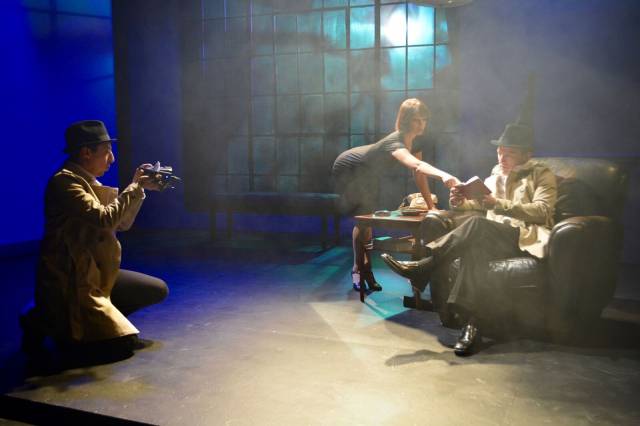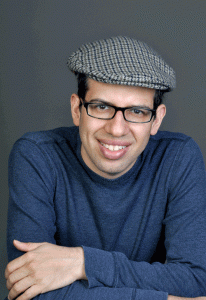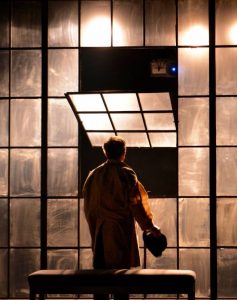

Playwright and director Edward Einhorn has been fashioning his own brand of absurdism and intellectual inquiry in the New York theater for more than twenty years. His latest play, City of Glass, is a stage adaptation of Paul Auster’s celebrated 1985 novel. A postmodern detective story about the mysteries of the author’s own identity (told by a quixotic writer named Quinn), City of Glass is being presented at the New Ohio Theater by The Untitled Theater Company #61 through March 12.
Was City of Glass your first foray into the mind of Paul Auster?
Edward Einhorn: It was the first thing of his I read. I’ve probably read about ten or twelve of his books. I immediately thought it would be perfect for the stage. It reminded me of Beckett and Ionesco, the two formative writers for me. Obviously it’s a surreal, introspective work and there were unique problems to solve, especially how to depict the central conceit about identity.
The way you’ve staged that with the three actors playing Quinn and his two creations/alter egos is mesmerizing. Sometimes they are dressed identically and they move in unison for a bit before branching off into three separate characters, each with his or her own style of movement. Was that developed ahead of time or was it worked out in rehearsal?
It was in the original script, although we did a workshop where we developed it further. The workshop was great for everyone because it’s hard for someone reading the script to see exactly what is going on inside my head. It was also very valuable to me because I discovered that every time we moved from the abstract to the more literal it lost something. So we developed that; the whole idea of using loops that the actor/dancers would be in and then break out of, the mirroring of that in the music, that seemed to be the best way. The performers all have training in both acting and dance, which is important because it’s movement-based work but they also have to play characters.
I had an extraordinary group of collaborators. Robert [Honeywell], who I’ve worked with for fifteen years, plays Quinn. He first played Richard III for me and played Vaclav Havel in the Havel play we did. We originally had someone else for Quinn in the workshop and then we asked Robert to come in and I knew I could count on him. He had to conquer a massive amount of material in a short amount of time and it was amazing the way he integrated it into himself. It happens more each show.

Have you worked with all of these collaborators before?
Yes. Mateo [Moreno], was also a silent character in my production of Havel’s The Pig, he was a character who was always watching everything silently and then it became clear that he was watching on behalf of the communist government. He was great in that part, he brought a lot of power to it. Dina [Rose Rivera] first performed for me last year in a piece called Money Lab. She did a dance in that called “Dead Cat Bounce” which was about stock market jargon and the 2008 collapse. She was a featured dancer in The Metropolitan Opera’s production of The Nose, she was great in that. What she is really doing here is embodying Paul Auster’s real wife Siri, and there is a beautiful delicacy to her that is perfect for that. It was funny when Siri met her, she said to me, “I’ve never shaken my own hand before!"
Auster’s novel references a lot of literature, especially detective novels. I found it quite interesting that that your play references detective movies, most interestingly in the music by Freddi Price. There are key moments that echo Miles Davis' score for Elevator to the Gallows, but mostly I think the music evokes the work of Angleo Badalamenti.
Badalamenti’s music was actually one of the things that was foremost in my head! Freddi and I went through a lot of movie scores as references before we started, mostly neo-noir moves from the '70s. I actually brought Freddi in over a year ago, I had seen him perform in a puppet piece at HERE called The Pigeoning. Freddi onstage, playing all of the music himself, seemed to me the perfect musical metaphor for Quinn. He’s a one-man band playing all the different instruments himself. It seemed a perfect reflection of the lead performer and of course his musical style is very beautiful and suits the piece on that level too.
I don’t feel the book or the play is actually satirical of detective fiction and yet I heard a great deal of laughter scattered through the audience all the way through.
I find a lot of humor in it, a lot of absurdist humor. One of the pople that laughed the hardest during the first performance was Siri! The Stillman scene always gets a lot of laughter, there is a lot of oddball humor in it to me. It depends on what your sense of humor is, of course. And sometimes people see something that simply makes them uncomfortable and they laugh at that.
The set design is quite impressive. I found the large, translucent glass wall at the back of the stage fascinating. You can see characters walking past it, doing things you can’t always see clearly. The glass is translucent rather than perfectly transparent, so although you think you can see what is going on, it isn’t really as clear as it first appears.
Right. I thought about using cracked glass originally. We did some tests that were useful and we tried out different things. There was a lot of testing of different materials and we tried dirtying them all in different ways. We finally settled on a specific formula to make the glass dirty. The designers were all there at the workshop and it was during the workshop that a great deal of their work was created. When we got to the rehearsals, a lot of that work was done. That was a nice luxury to have.

How long did you rehearse?
About four or five weeks, which is also something of a luxury here in New York.
What are you working on next?
An adaptation of The Iron Heel, a Jack London book that was the first dystopian work written as a socialist tract. I’m interested in it because it has a peculiar reflection upon today’s time. It was written in 1888 and set in the near future, which at that time was the '10s and '20s of the last century. There is an election coming up between a socialist and an oligarch master of industry! (Laughs) So it’s a “crazy future”! In the story the socialists are gaining ground so the oligarch plots a fake terrorist attack.
That’s amazing!
I’m going to do something with it this summer. I may just do a workshop his summer then bring it back next summer. I want to bring it to community centers. It seems so relevant to right now that I want to get it up as soon as possible.
Do you see yourself as a political artist?
I call my theater a theater of ideas. Politics, science, philosophy… I’ve done Vaclav Havel’s political stuff, and we did Money Lab, which was our economics piece, which was both economical and political. This would be the first one that is a straightforward piece about socialism. I’m very interested in the socialist ideas of the turn of the 20th century and how that has all evolved. It is really fascinating, this whole burn-it-all-down philosophy that was going on at the time. I do feel that although we live in a particular time, it amazing to realize that all that stuff is really the same sort of anger about politics and chaos that was existing, in its own version, in its own day. Terrorism too.
I’m looking forward to seeing that. Congratulations on City of Glass and best wishes for a great run!
Thank you!
Performances of "City of Glass" continue through March 12.